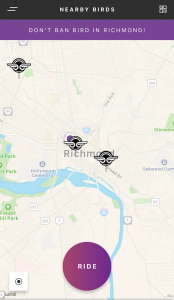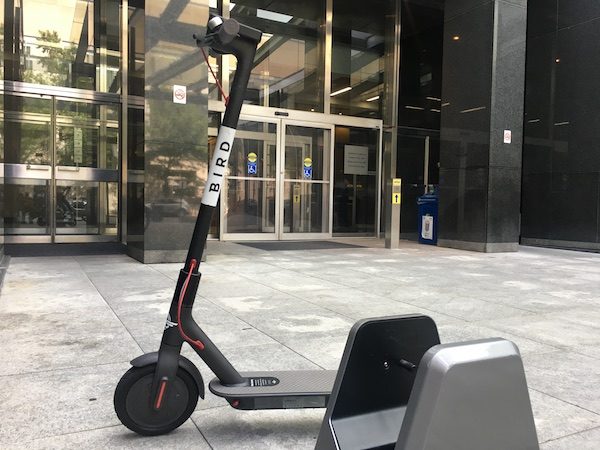After hitting the brakes on a dockless scooter startup a few weeks ago, Richmond’s mayor is now looking to get them rolling again.
Mayor Levar Stoney announced Wednesday that he will be presenting legislation to City Council next week that would allow for electric, dockless scooters and bikes to operate legally in Richmond.
Last month, California-based scooter startup Bird launched in Richmond unannounced, with dozens of the scooters placed on city sidewalks overnight. The city promptly impounded the scooters, contending that Bird was in violation of city ordinances relating to blocking public right-of-way.
The next day, Bird turned around and dropped more, only for the city to again scoop them up. City officials, including Stoney, met with Bird representatives soon after to discuss a path to potential legalization.
Stoney’s announcement this week said his legislation proposal would establish a one-year pilot program for companies that wish to operate dockless scooters and bikes in town.

Since having most of its scooters impounded, a handful of Bird scooters have remained in the Richmond region. (Mike Platania)
The legislation, which is being reviewed and finalized by the city attorney, would require companies to pay a $1,500 application fee and an annual permit fee.
The permit fee amount would be based on the number of scooters a company wants to deploy: $40,000 per year for up to 100 scooters, $60,000 for between 100 and 200 scooters, and $80,000 for more than 200, up to a maximum of 500.
Companies also would be required to provide customer service during all hours of operation, educate riders on legal parking methods, and establish safety practices and features such as promoting helmet and front- and rear-light usage.
After a year, the city’s public works department would review both the permit program and application process.
The legislation is scheduled to go before City Council at its next meeting Sept. 24.
Bird isn’t the only company looking to bring dockless scooters to Richmond. A few weeks prior to Bird’s local launch, fellow scooter startup Lime showed interest in the Richmond market. Lime since has been in touch with city officials.
Also scheduled to go before City Council at Monday’s meeting is an ordinance that would allow the city and Stone Brewing Co. to demolish the Intermediate Terminal building at 3101 E. Main St. to clear the way for a bistro concept. The building initially was planned to be converted to a bistro but was later deemed structurally insufficient.
City Council is set to delay voting on the matter until its Oct. 8 meeting. It will be the ninth time council has delayed voting on the matter.
After hitting the brakes on a dockless scooter startup a few weeks ago, Richmond’s mayor is now looking to get them rolling again.
Mayor Levar Stoney announced Wednesday that he will be presenting legislation to City Council next week that would allow for electric, dockless scooters and bikes to operate legally in Richmond.
Last month, California-based scooter startup Bird launched in Richmond unannounced, with dozens of the scooters placed on city sidewalks overnight. The city promptly impounded the scooters, contending that Bird was in violation of city ordinances relating to blocking public right-of-way.
The next day, Bird turned around and dropped more, only for the city to again scoop them up. City officials, including Stoney, met with Bird representatives soon after to discuss a path to potential legalization.
Stoney’s announcement this week said his legislation proposal would establish a one-year pilot program for companies that wish to operate dockless scooters and bikes in town.

Since having most of its scooters impounded, a handful of Bird scooters have remained in the Richmond region. (Mike Platania)
The legislation, which is being reviewed and finalized by the city attorney, would require companies to pay a $1,500 application fee and an annual permit fee.
The permit fee amount would be based on the number of scooters a company wants to deploy: $40,000 per year for up to 100 scooters, $60,000 for between 100 and 200 scooters, and $80,000 for more than 200, up to a maximum of 500.
Companies also would be required to provide customer service during all hours of operation, educate riders on legal parking methods, and establish safety practices and features such as promoting helmet and front- and rear-light usage.
After a year, the city’s public works department would review both the permit program and application process.
The legislation is scheduled to go before City Council at its next meeting Sept. 24.
Bird isn’t the only company looking to bring dockless scooters to Richmond. A few weeks prior to Bird’s local launch, fellow scooter startup Lime showed interest in the Richmond market. Lime since has been in touch with city officials.
Also scheduled to go before City Council at Monday’s meeting is an ordinance that would allow the city and Stone Brewing Co. to demolish the Intermediate Terminal building at 3101 E. Main St. to clear the way for a bistro concept. The building initially was planned to be converted to a bistro but was later deemed structurally insufficient.
City Council is set to delay voting on the matter until its Oct. 8 meeting. It will be the ninth time council has delayed voting on the matter.




Who needs “enhanced bus service” to Henrico when you can use these scooters instead? (See Richmond BizSense article about bus service. https://richmondbizsense.com/2018/09/19/enhanced-bus-service-rolls-henrico-picking-pulse-left-off/)
What happens when someone injures themselves-or someone else-on a bumpy sidewalk or potholed street? Looks like more business for insurance companies, lawyers, and doctors/hospitals.
No need to panic, but there are some good points made in the below link about litter and injuries:
https://www.defenseone.com/threats/2018/09/pentagon-declares-war-scooters/151406/
The legislation is to be introduced and then assigned to a Council committee. It won’t be discussed or voted on just read into record at the end of the meeting by the Deputy Clerk. Unless the Mayor expedites the paper for consideration, Council will review it in their mid- October committee meeting and since they only have one meeting in October the paper will be before Council for a vote in early November.